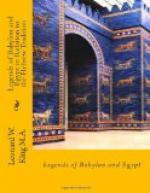abbreviated Semitic form which we find in the Gilgamesh
Epic. For not only are the first two elements
of the Sumerian name identical with those of the Semitic
Ut-napishtim, but the names themselves are equated
in a later Babylonian syllabary or explanatory list
of words.(1) We there find “Ut-napishte”
given as the equivalent of the Sumerian “Zisuda”,
evidently an abbreviated form of the name Ziusudu;(2)
and it is significant that the names occur in the
syllabary between those of Gilgamesh and Enkidu, evidently
in consequence of the association of the Deluge story
by the Babylonians with their national epic of Gilgamesh.
The name Ziusudu may be rendered “He who lengthened
the day of life” or “He who made life long
of days",(3) which in the Semitic form is abbreviated
by the omission of the verb. The reference is
probably to the immortality bestowed upon Ziusudu
at the close of the story, and not to the prolongation
of mankind’s existence in which he was instrumental.
It is scarcely necessary to add that the name has
no linguistic connexion with the Hebrew name Noah,
to which it also presents no parallel in meaning.
(1) Cf. Cun.
Texts in the Brit. Mus., Pt. XVIII, pl.
30,
l. 9 (a).
(2) The name in the Sumerian Version is read by Dr. Poebel as Ziugiddu, but there is much in favour of Prof. Zimmern’s suggestion, based on the form Zisuda, that the third syllable of the name should be read as su. On a fragment of another Nippur text, No. 4611, Dr. Langdon reads the name as Zi-u-sud-du (cf. Univ. of Penns. Mus. Publ., Bab. Sec., Vol. X, No. 1, p. 90, pl. iv a); the presence of the phonetic complement du may be cited in favour of this reading, but it does not appear to be supported by the photographic reproductions of the name in the Sumerian Deluge Version given by Dr. Poebel (Hist. and Gramm. Texts, pl. lxxxviii f.). It may be added that, on either alternative, the meaning of the name is the same.
(3) The meaning of the Sumerian element u in the name, rendered as utu in the Semitic form, is rather obscure, and Dr. Poebel left it unexplained. It is very probable, as suggested by Dr. Langdon (cf. Proc. Soc. Bibl. Arch., XXXVI, 1914, p. 190), that we should connect it with the Semitic uddu; in that case, in place of “breath”, the rending he suggests, I should be inclined to render it here as “day”, for uddu as the meaning “dawn” and the sign UD is employed both for urru, “day-light”, and umu, “day”.
It is an interesting fact that Ziusudu should be described simply as “the king”, without any indication of the city or area he ruled; and in three of the five other passages in the text in which his name is mentioned it is followed by the same title without qualification. In most cases Berossus tells us the cities from which his Antediluvian rulers came; and if the end of the line had been preserved it might




